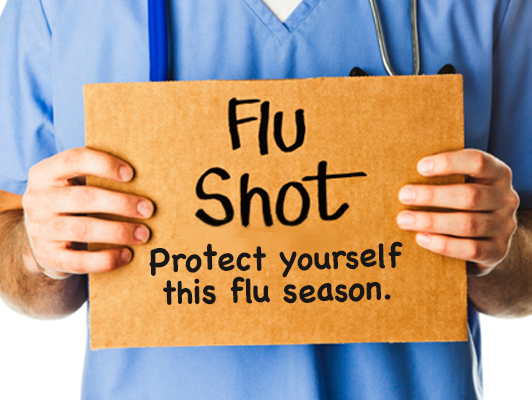Protect yourself this flu season
No one likes getting the flu, yet every year people decide not to get vaccinated against it. When you’re sick, you miss work, school, or even worse get others sick. Is it worth not being protected?
What factors increase the risk for getting the flu or experiencing complications?
- Age: Children, infants, and people over the age of 65 are at increased risk for the flu as well as complications related to having the flu.
- Chronic conditions: Individuals with chronic conditions like asthma, diabetes, or heart problems may be at increased risk for complications related to having the flu.
- Living conditions: People who live in crowded areas like school dorms or military barracks and nursing homes are at increased risk for getting the flu.
- Occupation: Professionals who have close contact with a lot of people are at increased risk of getting the flu. Examples include health care workers, teachers, and other professionals.
How can you reduce your risk for getting the flu?
- Get vaccinated: The Centers for Disease Control and prevention recommends that all Americans over the age of 6 months get an annual flu vaccination. This is your best defense against the flu because the vaccination contains protection against the three most common viruses expected this season. The vaccination isn’t 100% effective so it’s important to take other measures of protection.
- Use hygiene etiquette when coughing and sneezing: If you have to cough or sneeze, remember to cover your mouth and nose. Put used tissues into a garbage can. When a tissue is not available, avoid using your hands — sneeze into your upper sleeve or the crook of your elbow.
- Wash your hands: It’s important to use frequent hand-washing as a protective measure. Remember to scrub your hands vigorously for at least 20 seconds (hum the Happy Birthday song from beginning to end twice). When soap is not available, use alcohol-based hand sanitizers.
What are some myths about the flu?
The flu vaccine will give you the flu: While you can still get the flu even if you are vaccinated, the vaccination itself does not give you the flu. You may, however, experience soreness, redness, or swelling where the shot was given. Other side effects include a low grade fever or aches.
Young and healthy individuals aren’t at risk for the flu: Protection is the reason to get vaccinated. While you may recover fine from the flu if you are young and healthy, there still is the possibility of complications. Basically, why suffer if you can prevent it?
The flu vaccination can be dangerous: Some individuals believe the flu vaccination is linked to the development of certain disorders in children, specifically autism. There is no evidence that suggests this is true. But experts agree that you should talk to your health care provider about your concerns and all options.
Flu season will be in full force soon. Make sure you talk to your health care provider on flu protection and the best options for you and your family.



